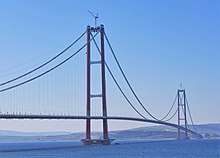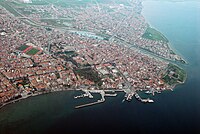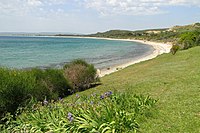Çanakkale Province
You can help expand this article with text translated from the corresponding article in Turkish. (December 2009) Click [show] for important translation instructions.
|
Çanakkale Province
Çanakkale ili | |
|---|---|
 | |
 Location of the province within Turkey | |
| Coordinates: 40°02′27″N 26°33′37″E / 40.04083°N 26.56028°E | |
| Country | Turkey |
| Seat | Çanakkale |
| Government | |
| • Governor | İlhami Aktaş |
Area | 9,817 km2 (3,790 sq mi) |
| Population (2022)[1] | 559,383 |
| • Density | 57/km2 (150/sq mi) |
| Time zone | UTC+3 (TRT) |
| Area code | 0286 |
| ISO code | TR-17 |
| Website | www |
Çanakkale Province (Turkish: Çanakkale ili) is a province of Turkey, located in the northwestern part of the country. It takes its name from the city of Çanakkale. Its area is 9,817 km2,[2] and its population is 559,383 (2022).[1]

Like Istanbul, Çanakkale province has a European (Thrace) and an Asian (Anatolia) part. The European part is formed by the Gallipoli (Gelibolu) peninsula, while the Asian part is largely coterminous with the historic region of Troad in Anatolia. They are separated by the Dardanelles strait, connecting the Sea of Marmara and the Aegean Sea.
The archaeological site of Troy is found in the Çanakkale province, near the village Tevfikiye.
Çanakkale District is the most populous district of the province. The European and Asian parts of the province were connected to each other with the completion of the Çanakkale 1915 Bridge in March 2022.
History
[edit]In the early Turkish Republic, the Çanakkale Province came into existence with the abolition of the Ottoman-era sanjaks of Biga and Gelibolu. According to a population census in 1927, Çanakkale had 8,500 inhabitants, except its neighbouring villages. It is recorded that Çanakkale, which was also called as "Hellespontos" and "Dardanelles" in ancient times, has accommodated many civilizations for about 3,000 years. Even the Archaic Troy (Troia) city, formerly governed by Lydians and destroyed by the devastating earthquake in 2500 BC, has ruins surviving to today. In 336 BC, the Persian Empire, which became the crucial power in Anatolia, was conquered by Alexander the Great. Also with the ruin of the Anatolian beylik of Karesi, most of the territory of Çanakkale was conquered in the Ottoman era, with the assistance of the castles in remuneration for helping to Byzantine Empire, locating Gelibolu. Afterwards, the Çanakkale strait was given to the Ottoman Empire.
The province was included in the Second Inspectorate General on the 19 February 1934 which span over the provinces of Edirne, Çanakkale, Kırklareli, Tekirdağ.[3] It was ruled by an Inspector General who had wide-ranging authorities over civilian, military and educational matters.[4] The office of the Inspectorate-General was abandoned in 1948[5] but the legal framework of the Inspectorate-Generals was only abolished in 1952, under the Government of the Democrat Party.[6]
Agriculture
[edit]The province of Çanakkale is a notable region for viticulture and winemaking in Turkey. The region between Saros Gulf and Gelibolu on the Gallipoli peninsula is cultivated with vineyards.[7] Wine producer "Suvla" is located in Suvla.[8]
Environment
[edit]As of 2020[update] several of the country's coal fired power stations are here,[9] some with smokestack filters which do not meet regulations.[10]
Districts
[edit]
Çanakkale province is divided into 12 districts, including the capital district Çanakkale (or Merkez):[11]
| District | Continent | Population | Area km2 |
Density /km2 |
|---|---|---|---|---|
| Ayvacık | Asia | 34,549 | 872 | 39.6 |
| Bayramiç | Asia | 28,952 | 1,085 | 26.7 |
| Biga | Asia | 92,180 | 1,266 | 72.8 |
| Bozcaada | Asia | 3,120 | 37 | 83.3 |
| Çan | Asia | 47,954 | 876 | 54.7 |
| Çanakkale | Asia | 197,841 | 1,029 | 192.3 |
| Eceabat | Europe | 8,684 | 416 | 20.9 |
| Ezine | Asia | 31,848 | 768 | 41.5 |
| Gelibolu | Europe | 43,984 | 830 | 53.0 |
| Gökçeada | Europe | 10,348 | 283 | 36.6 |
| Lapseki | Asia | 29,336 | 867 | 33.8 |
| Yenice | Asia | 30,587 | 1,476 | 20.7 |
| Europe (3 districts) | 63,016 | 1,528 | 41.2 | |
| Asia (9 districts) | 496,367 | 8,276 | 60.0 | |
| Total | 559,383 | 9,804 | 57.1 |
Gallery
[edit]-
Çanakkale
-
Çanakkale Trojan Horse
-
Çanakkale Martyrs' Monument
-
A ferry going from the town of Çanakkale to Gallipoli peninsula
-
A view of Çanakkale from the Dardanelles
-
Historical clock tower in Çanakkale town center
-
Anzac Cove of Gallipoli Peninsula
-
Ruins of the Temple of Athena, in Assos
See also
[edit]References
[edit]- ^ a b "Address-based population registration system (ADNKS) results dated 31 December 2022, Favorite Reports" (XLS). TÜİK. Retrieved 19 September 2023.
- ^ "İl ve İlçe Yüz ölçümleri". General Directorate of Mapping. Retrieved 19 September 2023.
- ^ Cagaptay, Soner (2006). Islam, Secularism, and Nationalism in Modern Turkey; Who is a Turk. Routledge. p. 47.
- ^ Pekesen, Berna (16 December 2019). Florian, Riedler; Kravietz, Birgit (eds.). The Heritage of Edirne in Ottoman and Turkish Times: Continuities, Disruptions and Reconnections. Walter de Gruyter GmbH & Co KG. pp. 423–424. ISBN 978-3-11-063908-7.
- ^ Bayir, Derya (2016-04-22). Minorities and Nationalism in Turkish Law. Routledge. p. 141. ISBN 978-1-317-09579-8.
- ^ Bozarslan, Hamit (2008-04-17). Fleet, Kate; Faroqhi, Suraiya; Kasaba, Reşat; Kunt, I. Metin (eds.). The Cambridge History of Turkey. Cambridge University Press. p. 343. ISBN 978-0-521-62096-3.
- ^ Akyol, Cahit (2005-06-04). "İşte Türkiye'nin şaraplık üzüm haritası". Hürriyet (in Turkish). Retrieved 2015-07-28.
- ^ "Çanakkale'den Yepyeni Bir Şarap Markası: 'Suvla'" (in Turkish). Çanakkale'nin Rehberi. Retrieved 2015-07-28.
- ^ "Polluted Air Takes More Lives Than Traffic Accidents". Sivil Sayfalar (in Turkish). 2020-02-03. Retrieved 2020-02-10.
- ^ Başkanı, M. M. O.; ki, Termik Santraller İle İlgili Bir Basın Açıklaması Yaptı-Kararara Haber – Güncel Hukuk Haberleri dedi (2020-01-24). "MMO Başkanı, Termik Santraller İle İlgili Bir Basın Açıklaması Yaptı". Enerji Portalı (in Turkish). Retrieved 2020-02-10.
- ^ "Turkey: Administrative Division". City Population. 12 Feb 2023. Retrieved 26 Oct 2023.
External links
[edit]- (In Turkish) Çanakkale governor's official website
- (In Turkish) Çanakkale Belediyesi
- (In Turkish) Çanakkale
- (In English) Çanakkale weather forecast information
- (In Turkish) Gökçeada
- (In Turkish) Gökçeada Nerede
Lua error in Module:Navbox at line 192: attempt to concatenate field 'argHash' (a nil value).










